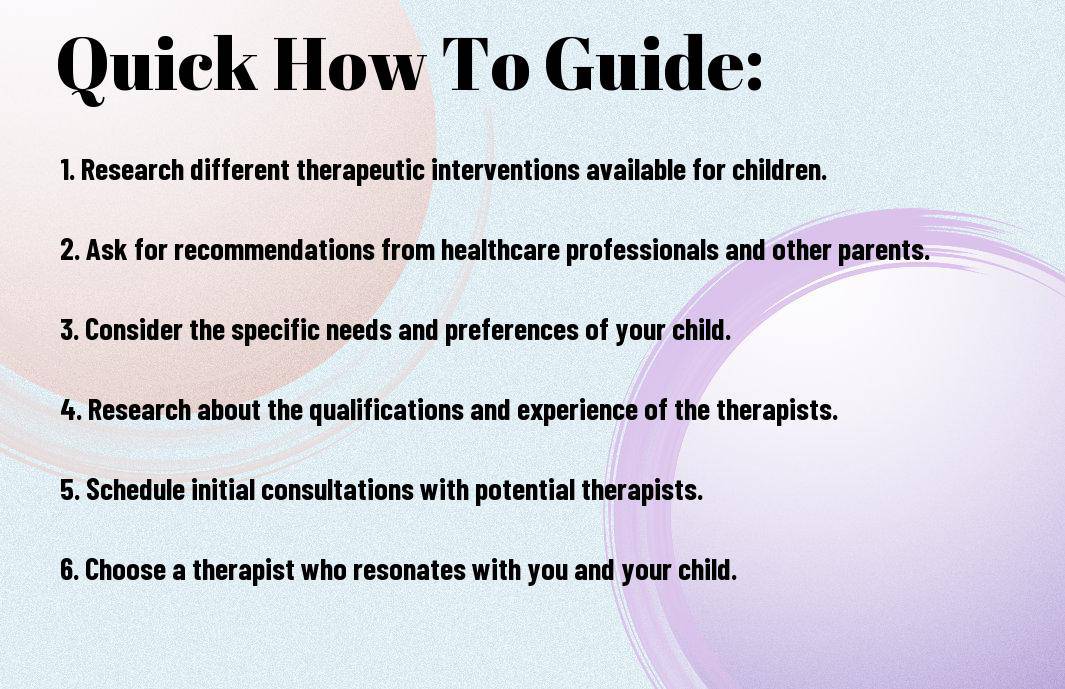Obtaining therapeutic interventions for your child can be a daunting task, but it is crucial to their well-being. With the myriad of options available, it is essential for parents to make well-informed decisions. In this guide, we will explore the most effective therapeutic interventions for children, discuss the potential risks involved, and provide a comprehensive framework for parents to make informed choices for their child’s emotional and mental well-being. From cognitive behavioural therapy to art therapy, we’ll delve into the positives and negatives of each approach, enabling you to make the best decision for your child’s individual needs. For a comprehensive resource on this topic, consider checking out Timely interventions: A parent’s guide to help your child …
Key Takeaways:
- Research is Key: It is essential for parents to thoroughly research different therapeutic interventions available for their child. This includes understanding the different types of therapy, success rates, and potential side effects.
- Consult with Professionals: Before making a decision, parents should seek advice from medical professionals and therapists who have experience in the specific intervention their child may need. Their expertise can provide valuable insights and guidance.
- Consider Individual Needs: Every child is unique, and it’s important for parents to consider their child’s individual needs and preferences when choosing a therapeutic intervention. Flexibility and understanding are crucial in finding the most suitable approach for their child’s well-being.

How-to Evaluate Your Child’s Needs
As a parent, it can be overwhelming to navigate the world of therapeutic interventions for your child. The first step in choosing the right intervention is to evaluate your child’s specific needs.
Identifying Key Symptoms and Behaviors
One of the crucial steps in evaluating your child’s needs is to identify the key symptoms and behaviours that are presenting challenges. This may include observing their social interactions, communication skills, emotional regulation, and any repetitive or restrictive behaviours. Keeping a detailed journal of these observations can help you track patterns and share specific examples with professionals.
Consulting Professionals for an Accurate Diagnosis
Consulting with professionals such as paediatricians, child psychologists, or educational specialists can assist in obtaining an accurate diagnosis for your child. This may involve conducting assessments, interviews, and observations to gain a comprehensive understanding of your child’s strengths and challenges. It’s vital to seek out professionals with experience in neurodevelopmental disorders, behavioural issues, or mental health to ensure proper evaluation.
Seeking professional guidance is essential in understanding your child’s needs and determining the most appropriate therapeutic interventions. Inaccurate diagnosis can lead to ineffective interventions, while an accurate diagnosis can significantly improve your child’s prognosis and quality of life. Take the time to gather information and consult with reputable professionals to ensure the best outcomes for your child.

Factors to Consider When Selecting an Intervention
When it comes to choosing the right therapeutic intervention for your child, there are several important factors that need to be taken into consideration. It’s crucial to assess these factors carefully in order to make an informed decision that will best support your child’s needs.
- Age and developmental stage: Consider your child’s current age and developmental stage when selecting an intervention.
- Evidence-based practice: Look for interventions that have been proven to be effective through research and evaluation.
- Success rates: Pay attention to the success rates of different interventions and consider the likelihood of positive outcomes for your child.
Age and Developmental Stage of Your Child
When choosing a therapeutic intervention, it’s important to take into account the age and developmental stage of your child. Different interventions may be more suitable for younger children as opposed to adolescents, or for those at different developmental stages. Tailoring the intervention to match your child’s specific needs at their current age and developmental stage will contribute to its effectiveness.
Evidence-Based Practice and Success Rates
When considering a therapeutic intervention, it is essential to look for approaches that are evidence-based and have demonstrated success rates. Evidence-based practices are rooted in research and have been shown to be effective in addressing challenges and promoting positive outcomes for children. By prioritising interventions with a track record of success, you can increase the likelihood of improvement and progress for your child.
It’s important to be cautious of interventions that lack evidence-based support or have low success rates, as these may not yield the desired results for your child. By opting for interventions that have a strong evidence base and demonstrated success rates, you can provide your child with the best chance for positive and meaningful change.
Tips for Comparing and Choosing Therapies
When comparing and choosing therapies for your child, it’s important to consider a few key factors. Here are some tips to help you make an informed decision:
- Research the available therapies thoroughly
- Consider the qualifications and experience of the therapists
- Evaluate the potential benefits and risks of each therapy
- Take into account your child’s individual needs and preferences
- Seek recommendations from trusted healthcare professionals
Any decision regarding therapy selection should be made after careful consideration and consultation with qualified professionals.
Aligning Therapies with Family Values and Dynamics
It’s essential to align therapies with your family’s values and dynamics. Therapies that resonate with your family’s beliefs and preferences are more likely to be effective in the long run. Additionally, considering your family’s dynamics and daily routine can help you choose a therapy that fits seamlessly into your lifestyle.
Assessing the Qualifications of the Therapist
When choosing a therapist for your child, it’s crucial to assess their qualifications diligently. Look for therapists who have the necessary training and licensure in their respective fields. Additionally, consider their experience working with children and families, as well as their approach to therapy. Any decision made in this regard should be based on thorough research and consultation with professionals in the field.
It’s important to choose a therapist who not only has the requisite qualifications, but also aligns with your family‘s values and dynamics. Effectively assessing therapists‘ qualifications will ensure that your child receives the best possible care.

Implementing the Chosen Intervention
Now that you have selected the most suitable therapeutic intervention for your child, it is important to understand how to implement it effectively. This phase requires careful planning and preparation to ensure that your child receives the maximum benefit from the chosen intervention. Here are some essential steps to follow in the implementation process.
Preparing Your Child for Therapy
Before beginning any therapeutic intervention, it is crucial to prepare your child for what to expect. Be open and honest about the process, and let them know that this is to help them overcome any difficulties they may be facing. Encourage them to ask questions and express their feelings about the therapy. You can find more detailed guidance on supporting your child through therapy in the Parents Guide to Good Care | Learning Disorders.
Tips for Being an Active Participant in the Process
As a parent, your involvement in the therapeutic process is crucial. Here are some tips to help you be an active participant in your child’s therapy:
- Be engaged and informed about the intervention.
- Collaborate with the therapist and be proactive in understanding your child’s progress.
- Support your child at home by reinforcing the skills learned in therapy.
The more involved and supportive you are, the more effective the intervention will be for your child. The positive impact of your involvement cannot be overstated.
Monitoring Progress and Making Adjustments
Monitoring the progress of your child’s therapeutic interventions is crucial to ensure that they are receiving the most effective treatment. It is important to regularly assess your child’s development and behaviour in order to make any necessary adjustments to their therapy plan. This may involve collaborating closely with their therapists and other professionals involved in their care to track their progress and identify any areas for improvement.
Setting Realistic Goals and Expectations
When setting goals for your child’s therapy, it is important to be realistic about what can be achieved. Discuss the goals with your child’s therapists and ensure that they are specific, measurable, achievable, relevant, and time-bound (SMART). By setting realistic expectations, you can help your child make steady progress and avoid unnecessary disappointment.
When and How to Seek a Second Opinion
If you have concerns about your child’s therapeutic interventions or are unsure about the progress they are making, it may be necessary to seek a second opinion. This could involve consulting with another professional in the field to gain an alternative perspective on your child’s treatment plan. It is important to be proactive in seeking a second opinion if you feel that your child’s needs are not being adequately met.
Obtaining a second opinion can provide valuable insight and reassurance, or it may lead to adjustments in your child’s therapy plan that could make a significant positive impact on their development.
A Parent’s Guide to Therapeutic Interventions and How to Choose
In conclusion, navigating the world of therapeutic interventions for your child can be overwhelming, but with the right guidance, it is possible to make informed decisions. Understanding the different types of interventions and their potential benefits is crucial in choosing the most suitable approach for your child’s needs. It is important to consider the advice of professionals, while also trusting your instincts as a parent. By staying informed and actively participating in the decision-making process, you can ensure that your child receives the best possible support. Ultimately, the well-being and progress of your child should be at the forefront of any therapeutic intervention choice, and with the right approach, positive outcomes can be achieved.
FAQ
Q: What are therapeutic interventions for children?
A: Therapeutic interventions for children are designed to address emotional, behavioural, and mental health issues through various forms of therapy such as play therapy, cognitive behavioural therapy, and family therapy.
Q: When should a parent consider therapeutic interventions for their child?
A: Parents should consider therapeutic interventions for their child when they notice persistent behavioural or emotional concerns that impact their child’s daily functioning, relationships, or overall well-being.
Q: How can parents choose the right therapeutic intervention for their child?
A: Parents can choose the right therapeutic intervention for their child by consulting with mental health professionals such as psychologists, therapists, or counsellors who can assess the child’s needs and recommend the most suitable approach.
Q: What are the potential benefits of therapeutic interventions for children?
A: The potential benefits of therapeutic interventions for children include improved emotional regulation, enhanced coping skills, better communication, and the development of healthy relationships.
Q: Are there any potential risks or considerations when it comes to therapeutic interventions for children?
A: While therapeutic interventions can be beneficial, it’s important for parents to consider potential risks such as the child’s readiness for therapy, the potential for re-traumatisation, and the importance of finding a qualified and experienced therapist.
Q: How can parents support their child during therapeutic interventions?
A: Parents can support their child during therapeutic interventions by being involved in the therapy process, communicating openly with the therapist, and providing a supportive and understanding environment at home.
Q: What are some additional resources for parents seeking guidance on therapeutic interventions for children?
A: Additional resources for parents seeking guidance on therapeutic interventions for children include books, websites, support groups, and workshops specifically focused on child and adolescent mental health and therapy options.







